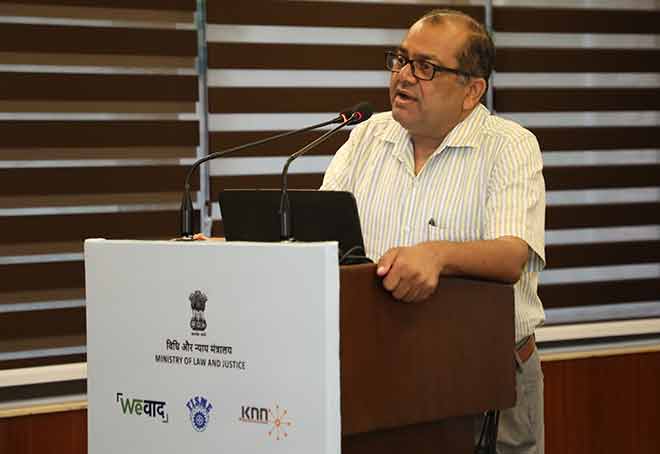Entrepreneurs Remark ‘Cost Of Litigation’ As Major Roadblock
Updated: Aug 22, 2023 03:54:43pm

Entrepreneurs Remark ‘Cost Of Litigation’ As Major Roadblock
New Delhi, Aug 22 (KNN) Entrepreneurs strive to evade the cost of litigation due to its cumbersome nature and enduring impact on their businesses, said Neeraj Kedia, Past President FISME & Chairman, Banking & Finance Committee.
Representing the industry perspective, he highlighted issues of MSME industry providing case studies.
He was a part of a panel discussion on litigation and MSMEs organised by FISME and moderated by Bishwajit Dubey, Former Partner at Cyril Amarchand Mangaldas.
Kedia further underscored how this very aspect acts as a deterrent for aspiring entrepreneurs.
He stated that Arbitration is the mechanism which depicts the intention of the government. A challenge encountered within arbitration is the extended duration of 12 to 15 months required for resolution of issue.
“Complications arise when the arbitration clause lacks clarity, leading to prolonged proceedings. Subsequently, the party that incurs a loss often resorts to Section 34 of Arbitration act, seeking appeal in the High Court. Interestingly, the High Court predominantly grants appeals favouring the initial order,” he said.
Further, he mentioned certain cases consisting of similar situations which are still pending in the High Court.
The first case (MSME v Railways) he shared was a dispute regarding abrupt and illegal termination of contract, wrong encashment of BGs. The time taken in the Arbitral Award was 13 months.
In this case the railway proposed an arbitrator and an appeal under section 34 was made to the HC for the same irrespective of whether the said award should go to High Court or not.
Till now 27 hearings have taken place while 5 judges have changed, it has been 48 months and continuing and they undergo all the pain.
The second case (MSME v BHEL) was regarding unilateral/arbitrary deduction of max LD from entire contract (Unjust enrichment). It has been 3 years and 4 months, time spent in conciliation was 5 months and in Arbitration was 1 year 9 months. 3 months was already spent in commercial court, Saket, dismissed for wrong forum and appeal under section 34 at High Court of Delhi where it has been 11 months and still counting.
The speaker further shed light on Insolvency and Bankruptcy Code by giving a brief introduction about the code. He talked about MSME dues with Companies under Insolvency Procedure, and what happens to an MSME supplier if its buyer, usually a large company, goes under insolvency.
He also addressed the relevance of MSMEs and the Insolvency and Bankruptcy Code (IBC) within the framework of Recovery Enhancement and Litigation Reduction.
Delving into various aspects, including the existing handling of MSME operational creditors (OCs), the unique considerations for MSME OCs he spoke about the interrelation between the MSME Act and IBC, the need for a harmonious interpretation to facilitate recovery, as well as the broader impact of these dynamics on the recovery and litigation landscape.
He referred to a current case involving an MSME supplier to Golden Jubilee Hotels (GJHPL) situated in Hyderabad, Telangana. In this case, an ongoing challenge pertains to the equitable treatment of operational creditors (OCs), leading to a stay on distribution by the National Company Law Appellate Tribunal (NCLAT).
The resolution process has become stagnant due to outstanding payments to the Government of Telangana (GoT). Here decisions made by the Committee of Creditors (CoC) were questioned w.r.t maintaining equity among OCs and adherence to commercial wisdom. “Also, there is need for clearer rules to prevent similar cases and promote equitable distribution,” he said.
The speaker also talked about Commercial disputes giving a brief introduction as to what all is included in commercial disputes. He also talked about Cheque bouncing (Section 138 of Negotiable Instruments Act, 1881) and how there are very large number of cases and shed light on Negligible priority for police.
He also discussed the lack of capacity in lower courts, lack of adequate administrative infrastructure and how there is delay in getting summons & warrants issued/served and execution of award is a dysfunctional system and how this seems to stops nowhere. (KNN Bureau)













